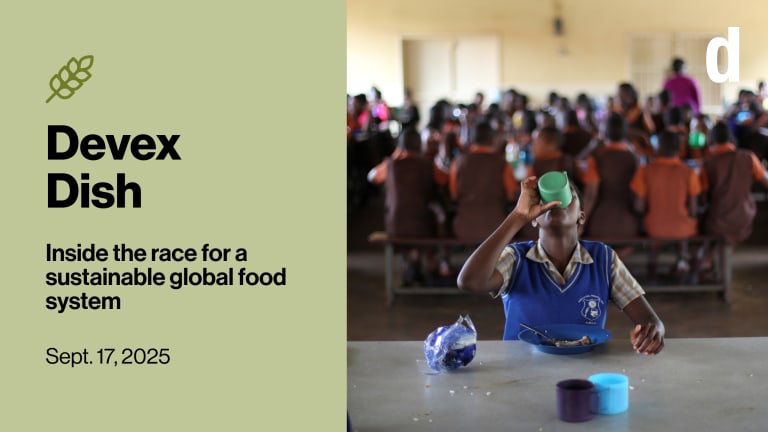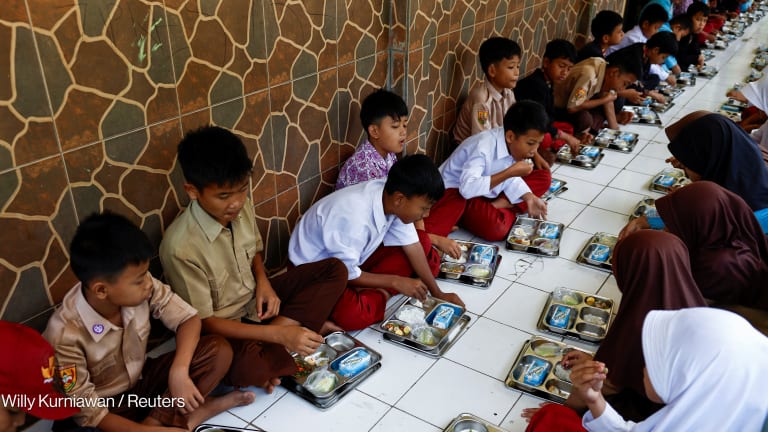
Several schools in Honduras continued to administer their daily free lunch program to children experiencing food insecurity despite switching to a combination of in-person and remote learning due to COVID-19. But a key obstacle meant many students had difficulty in accessing the meals: many had to commute up to an hour each way to receive the meal, using time that would have otherwise been spent on learning, schoolwork, and family time.
Fortunately, Banco de Alimentos de Honduras, a local food bank, stepped in to address this challenge.
Understanding how many children depended on these meals, the food bank, school, and community service organizations devised a program that enabled kids to receive their daily meal and avoid an arduous commute on days when there were no in-person classes. They created three community food distribution sites within the school district and linked each child to the site closest to their home. In July 2021 alone, more than 250 children in rural communities of Honduras received free school lunches thanks to the program.
The food bank’s agile solution proved to be significant. It addressed issues of sustaining both meals and education for the children while bolstering community partnerships and supporting families’ well-being.
As we recognize the Africa Day of School Feeding on March 1 and International School Meals Day on March 10 and reflect on the urgent importance of alleviating child hunger, success stories like these remind us why the work of our organizations — The Global FoodBanking Network and Global Child Nutrition Foundation — and that of food banks and school meals programs across the globe is so important.
For millions of children around the world, school feeding programs are their only guarantee of a nourishing meal. This became especially clear when school closures due to COVID-19 deprived 370 million children of access to one consistent meal every day.
Beyond nutrition
But creating and sustaining school meals programs is critical for reasons beyond addressing hunger. Such programs can reduce poverty, improve educational outcomes, support sustainable food systems, advance equality for vulnerable groups, and strengthen vulnerable communities.
GCNF’s recent global survey of countries with large-scale school meals programs — the first comprehensive global database mapping their existence and activities — shows that many countries and their communities recognize the benefits of these programs.
• 80% of countries surveyed had a designated line item in their national budget for school feeding activities. Those with line items were able to feed more kids compared to those without one.
• In 90% of countries, there is strong community engagement and ownership of decision making in school meals programs. This enables parents, teachers, and nonprofits to have a strong say in how the programs could be most beneficial to their children and community.
• In addition to providing meals, many countries’ programs also prioritized nutrition and health education: 91% of programs offered nutrition education, 78% paired their feeding programs with school gardens to teach children how to plant and grow food, and hand-washing with soap was reported as required by virtually all programs.

The value of food banks in addressing the gaps
Despite these positive trends, data shows that there are still significant gaps in many programs around the world and the ability of a program to meet a child’s needs is too often the lowest where the needs are greatest. This is why food banks such as GFN-member Banco de Alimentos de Honduras are so important.
Local food banks help extend the reach of such programs — and their outsized impacts — when government-run school meals programs are not yet established in the communities where they are needed or when they do exist but are unable to meet every child’s needs. For example, out of GFN’s 49 partner food banks, 38 support child feeding programs. And of those, 25 provide school breakfast or lunch.
Thanks in part to programs addressing the needs of children and families, 17.6 million children received meals from network food banks in 2020 alone, and GFN continues to provide assistance for those looking to create or expand their school meals programs to reach more children.
There is still much to be done to ensure that school meals programs and the food banks that support them are well-resourced and access to a nutritious school meal is provided to all children. Many leading organizations are working on this important issue, but one notable global effort is gaining traction for its attempt to unify partners to address child hunger.
Launched in 2021 at the UN Food Systems Summit, the government-led School Meals Coalition aims to strengthen school meals programs by creating a coalition of public sector, civil society, and community partners to help mobilize advocacy, financial, and political resources to ensure that children are fed, especially in the most vulnerable communities. We’re proud to align our organizations with this vital global effort.
At its core, child hunger is a grave social injustice. While the systemic issues that cause it — poverty, economic instability, conflict, natural disasters, and gender and racial inequality — are not easily solvable, creating, strengthening, and sustaining school meals programs, as well as the food banks that support them, is a straightforward solution that can change millions of children’s lives for the better.









